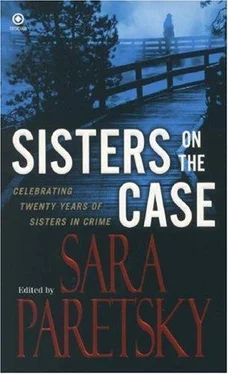She swung the racket, catching Tiffany neatly on her cute little ass, remembering to follow through, which I never did. Upending the bag, she dumped out a pink iPod, pink visor and wristbands, and a pair of pink and white tennis shoes.
‘‘Sterlie gave me those,’’ Tiffany said.
‘‘My iPod, my clothes, my shoes, my racket. All the stuff from my tennis bag.’’ Natalie drove her backward with vicious swings of the racket. ‘‘Goddammit, what were you thinking? It wasn’t enough to steal my husband and leave my kids without a father, you had to steal my things, too? You had to know they weren’t his.’’
Tiffany, looking stricken, pressed a knuckle against her trembling lip. This was what I talked to teenagers about all the time-had they considered the consequences of their choices and were they willing to accept those consequences?
Natalie swung the racket past the pert little nose with admirable control. ‘‘I said, ‘What were you thinking?’ ’’
‘‘He wanted me to have them.’’ Tiffany sounded like she was about to cry. ‘‘He was so embarrassed that his own children wouldn’t let him in when he just wanted to get some papers. It was really unpleasant. He knew I felt uncomfortable, so he gave me this stuff to make me feel better.’’
‘‘I’ll show you uncomfortable.’’ Natalie swung toward Tiffany’s head as I stepped between them.
‘‘You’re crazy, you know.’’ Tiffany scrabbled for a cell phone. ‘‘I’m calling the police. You belong in jail.’’
‘‘I’m not sure you want to do that,’’ I said.
Worried that we’d helped Natalie commit an assault, I looked to Katie, who shook her head. ‘‘We’re all witnesses that Natalie found Tiffany in possession of over a thousand dollars’ worth of her property,’’ she said. ‘‘Tiffany’s a thief and that’s a felony. Even if Mr. Burke gave it to her, he stole it and she was there. That makes her an accessory and a receiver of stolen property.’’
Katie turned toward me, as though I was the leader of this group. ‘‘Anything else?’’
My mind was a jumble of thoughts about relationships, the common decency we owed each other, and sorrow that someone so young could be so selfish and could wreak so much havoc without any thought. I also knew why I was so angry and who I was angry at. Guys who defaulted on their marriage contracts and the women who, actively or passively, aided and abetted them. Including myself. My words rolled out.
‘‘Tiffany, what you want is not all that matters. You and Sterling aren’t alone in this relationship. The choices you make have consequences for five other people. You’re not an innocent party, you’re an active player in your own life. You have to take responsibility for the choices you make. Don’t assume you can hurt people terribly and walk away untouched.’’
Natalie and Sandy and Katie flanked me like we were a real team, their approving glances saying I was making real sense. This wasn’t just about Tiffany and Sterling and Natalie. It was about making considered choices and taking action when things weren’t right. I might still be jumbled but some of the right things had been shaken loose.
Tiffany looked down at the open cell phone in her hand.
‘‘Felony,’’ Katie said.
Tiffany snapped the phone shut, shoved it in her purse, and went inside.
‘‘Wow. Thank you all,’’ Natalie said. ‘‘I never thought I’d get all this from a self-defense course.’’
Neither had I. ‘‘Ninjettes rock,’’ I said.
We high-fived and walked back to the Subaru.
The People’s Way by Eve K. Sandstrom
The worst part was that Rogar was trying to be kind.
‘‘You must see that there is no other way,’’ he said. ‘‘The baby has to die.’’
Amaya pulled her legs up against her chest and laid her head on her knees, shaping her body into a coconut. She had no more words. If she spoke again, the tears inside would spill onto the hut’s sandy floor, and the hard coconut husk she was using to conceal herself would crack. All her fears and her griefs and longings would be revealed to this man she did not understand and to the strange people of his clan.
She turned her face away from Rogar. She stroked the back of the tiny girl sleeping on the grass mat.
Rogar spoke again. ‘‘It’s not just my people who do this. It was the same on your island.’’
Amaya didn’t move, but she felt the air pass over her, and she knew Rogar had gestured angrily.
‘‘Elosa says there is not enough for my clan to eat,’’ he said. ‘‘If we had plenty, we could keep your sister’s child. But we don’t have food for her.’’
‘‘She can share my food,’’ Amaya said softly.
‘‘No! You would become weak. You should bear our own child. And we need you to work. You must remain strong.’’ Rogar put his hand on her arm. Amaya did not pull away. She barely felt his touch on her coconut shell arm. Did the arm feel rough and hard to him?
‘‘Is it kind to keep the little one if we cannot feed her?’’ Rogar said. ‘‘Is it kind to keep the little one if the other women here hate her? If she will be an outcast in this clan? No! It’s better to put her in the water now. Better for her. Better for you. Better for all of us.’’
He paused, but Amaya still hid behind her hard outer husk. The silence grew between them.
Rogar sounded despairing when he finally spoke. ‘‘We cannot oppose Elosa. She is the one who decides.’’
Amaya spoke then. ‘‘And Elosa hates me.’’
‘‘Don’t be foolish!’’
Amaya did not answer. What purpose was there in arguing with this man whom she knew so little, yet who had power over her, over the little one? She had thought she loved him. But he would not listen.
After another long silence Rogar stood up. ‘‘I’m sorry, Amaya. It’s decided. I’ll take the baby into the water as soon as it’s light.’’
He walked softly from the hut, into the darkness.
Amaya sat motionless. If she moved, her husk would crack. She kept her hand on the sleeping baby. Little Tani, all Amaya had left of her sister, of her own clan, of her own home on the westward island. If only, if only she had not left there!
Amaya had liked Rogar’s looks as soon as he and his friends had come to her island, bringing dried fish and cloth to trade. He was strong and well-made, with broad shoulders. He had smiled at her. She had been flattered that such a handsome man had liked her. And he had come from afar. If she went with Rogar, she could see other islands, meet new clans.
She had been pleased when he offered her uncle a bride-price. Her uncle hesitated, but Amaya made it clear that she wanted him to accept Rogar as her husband. Her uncle had said yes, and she had willingly gone with Rogar to his own island.
Then she had met Elosa. Elosa had hated Amaya from the moment she stepped on the shore of the lagoon. And as shaman, Elosa was one of the most important members of Rogar’s clan. Her hate was serious. It had meant Amaya was shunned by all but Rogar’s close family.
Rogar’s mother had welcomed her as a mother-in-law should. Amaya had even thought she saw a slight feeling of exultation in her greetings. But most of the other women had been unfriendly-or perhaps fearful. They had spoken to her, but only sometimes. If they met alone in the forest, they would stop and talk. But if she met the women in a group, they would lower their eyes and pass by.
Amaya had asked her mother-in-law about it. ‘‘Why? What have I done?’’
‘‘You’ve done nothing, Amaya. They are afraid of Elosa.’’
‘‘But she is the shaman. She is responsible for the clan’s welfare.’’
Читать дальше












